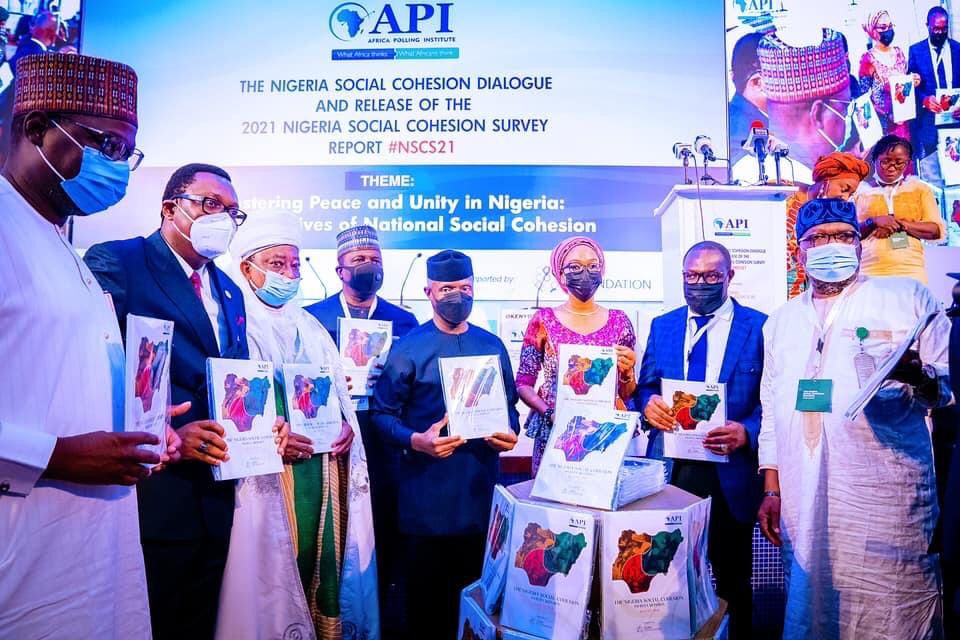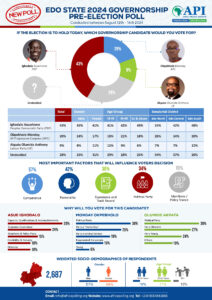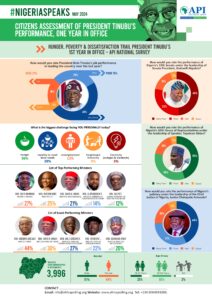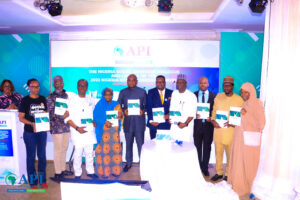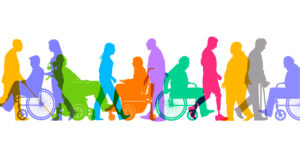Abuja, Nigeria, August 27th, 2021 – Africa Polling Institute hereby announces the release of the Nigeria Social Cohesion Survey (#NSCS2021) Report. The survey was undertaken to develop a social cohesion index for Nigeria and measure citizens perception on the state of social cohesion.
The Nigeria Social Cohesion Index (NSCI) was computed as 44.2%, which is below the average 50 percentage point, and indicating that Nigeria is not as socially cohesive as it ought to be. The survey findings report growing citizens distrust towards the state and fellow citizens; as well as a proclivity towards ethnicity over nationalism. It also reports that the country has become more divided today than it was 4 years ago, as observed by 65% of citizens interviewed; representing a whopping 20-points increase from 2019’s score of 45%. There’s evidence to suggest that the country has become more divided along ethnic, socio-economic, political and religious lines, thereby threatening the social fabric, unity and peaceful co-existence of the country. There’s need for more proactive action on the part of government and stakeholders to promote peaceful co-existence, stability, inclusion and hope in Nigeria.
Africa Polling Institute (API), with the support of Ford Foundation, conducted a nationwide Citizens Perception Survey (CPS) to measure social cohesion in Nigeria, between the months of April and May 2021. A total of 8,114 contacts were contacted, out of which 5,363 interviews were completed, representing a response rate of 66.09%. All interviews were conducted by Face-to-face Household Interviews, using the Stratified Random Sampling technique; with citizens aged 18 years and above. The interviews were conducted in five major languages: English, Pidgin, Hausa, Igbo and Yoruba; and geographic quotas were assigned to ensure that all Senatorial District and States were proportionately represented in the sample.
The concept of social cohesion refers to the willingness of citizens of a country to cooperate and work together towards ensuring the survival and prosperity of the country. Drawing from the literature, and building upon the 2019 survey round, ten key indicators were instrumentalized to measure social cohesion in Nigeria – Identity, Trust, Social Justice, Participation and Patriotism, Natural Resources Governance, Gender Equity, Impunity, Corruption, Self-Worth and Future Expectation.
Overall, the results of the Nigeria Social Cohesion Survey 2021 and the Nigeria Social Cohesion Index, computed with a score of 44.2%, suggest that Nigeria currently falls slightly below the average threshold of a socially cohesive country.
Key Findings from the 2021 Social Cohesion Survey
‘Identity’ Indicator
The survey revealed that 49% of Nigerians “feel disappointed in Nigeria”, compared to 42% of Nigerians that feel truly proud of the country; while 7% of Nigerians ‘feel indifferent and 2% of Nigerians feel uncertain about their feelings for the country. In addition, 65% of Nigerians believe that Nigeria is much more divided today than it was four years ago; compared to only 12% who said the country is much more united today, and 23% who believe that the country has stayed the same.
Overall, 82% of Nigerians feel comfortable with the dual identity of being both Nigerian and from their ethnic group, but to different proportions. Remarkably, 4 in 10 Nigerians are proud of being equally Nigerian and from their ethnic group; while about a third of citizens interviewed (33%) identify more with their ethnicity than with being Nigerian; compared to only 9% feel more Nigerian than ethnic.
‘Trust’ Indicator
The survey showed that citizens have more trust in Religious leaders (55%) and traditional leaders (44%); compared to the government of President Buhari (26%), the Judicial system (26%), the National Assembly (22%) and the Nigerian Police (22%).
‘Social Justice’ Indicator
Most of the citizens (71%) believe that all Nigerians are not equal before the law; versus 23% who feel otherwise. About 6 in 10 Nigerians (58%) express the view that the Federal Government isn’t making enough effort to promote a sense of inclusion for all ethnic groups in the country.
‘Participation & Patriotism’ Indicator
The survey findings showed that only 63% of citizens are “Extremely or Somewhat Willing” to cooperate with fellow citizens to make Nigeria more united.
‘Natural Resource Governance’ Indicator
The survey revealed that 59% of citizens believe that the government is managing the revenues from natural resources “Poorly”; while 41% of Nigerians “Agree or Strongly Agree” that the availability of natural resources fuels corruption in the country, compared to 40% citizens that “Disagreed or Strongly Disagreed”. As regards the derivation policy, 45% of citizens consider the 13% derivation policy “Unfair and Insufficient”.
‘Gender Equity’ Indicator
8 in 10 Nigerians (81%) agree that boys and girls should have equal access to education; 72% agree that both males and females should be judged based on their qualifications, competence and track records; 67% agree that women should be allowed to lead in politics, corporate entities and religious organizations; and 63% agree that women should be given equal opportunity to family inheritances.
Regarding the current administration’s efforts at promoting gender equity, about half of Nigerians (49%) rated this administration “Poorly”; as against about 2 in 10 Nigerians (21%) who rate government favourably.
‘Impunity’ Indicator
83% of Nigerians consider human rights violations a problem in the country. Also, 48% believe that most cases of human rights violations are never reported to the Police; and in cases where they are reported, 56% were more likely to report such cases to Community and Religious Leaders and not the Police.
53% of citizens believe that impunity thrives in the current administration and 83% believe impunity amongst government officials is “increasing”.
‘Corruption’ Indicator
Almost 7 in 10 citizens (69%) believe that the level of corruption has increased significantly in the past year, while 63% assess the government’s efforts at tackling corruption “Poorly”.
‘Self-Worth’ Indicator
Regarding self-worth, 56% of Nigerians feel “Extremely or Somewhat Dissatisfied” about their lives as Nigerians right now; while more than 7 in 10 Nigerians said they would relocate abroad with family members if they had an opportunity.
‘Future Expectation’ Indicator
Overall, almost 6 in 10 (59%) citizens believe that the future of the country would be much better than it is presently; compared to 27% who expressed pessimism that the future would be much worse.
Comparing Data from 2019 and 2021 Survey Rounds
The 2019 and 2021 survey rounds reveal marked differences:
The trend analysis reveals a decline in the proportion of Nigerians that feel truly proud of the nation. In 2019, 55% of citizens said they felt truly proud of Nigeria; however, by 2021 this proportion has declined to 42%, representing a 13% decline. Similarly, the proportion of Nigerians that feel truly disappointed in the country has increased – from 30% in 2019 to 49% in 2021, representing a 19% increase.
As regards national identity, there is a substantial decline in how the citizens view themselves. The data reveals a 17% decline between the 2019 data (57%) and 2021 data (40%). Similarly, while about a quarter of citizens (25%) viewed themselves as more ethnic than Nigerian in 2019, that group of citizens have moved to a third of citizens (33%) in 2021, representing an 8% increase.
The data reports that significantly more citizens (65%) in 2021, compared to 45% in 2019, believe that the country is much more divided today than it was 4 years ago. This represents a humungous 20% increase in the proportion of Nigerians who say the country is much more divide today.
The data reveal a substantial decline in the level of trust that citizens have for the Government of President Muhammadu Buhari. The difference between 2019 (42%) and 2021 (26%) reveal a significant 16% decline in citizens who had “A lot of Trust and Some Trust” in the Government of President Buhari.
Similarly, citizens trust for the National Assembly (NASS) also declined by 11% from 33% in 2019 to 22% in 2021. Trust in the Judiciary also declined by 6% from 32% in 2019 to 26% in 2021.
There’s been a whopping 41% increase in the proportion of citizens who would seize an opportunity to emigrate. In 2019, only about a third of citizens (32%) said they were willing to relocate with their families out of Nigeria; but by 2021, this proportion has grown dramatically to 73%.
Finally, in terms of the future expectations for Nigeria, the data reveals that the proportion of citizens who believe that the future of Nigeria will be better, decreased by 7% from 66% in 2019 to 59% in 2021. However, on the contrary, there was an increase in the proportion of citizens who believe that the future of Nigeria would be much worse than it is today – from 15% in 2019 to 27% in 2021.
Recommendations
API recommends that the Federal Government creates a National Cohesion Commission with the crucial responsibility for ensuring that all policies and activities of government have components within them that create a sense of belonging, promotes trust, fosters inclusive governance, and continuously offers citizens opportunities for upward mobility.
The Federal Government needs to forge a new national movement for Nigeria and Nigerians that inhibits centrifugal tendencies that cause or promote conflicts, division or separatism; but strengthens centripetal forces that promote unity, oneness and peaceful co-existence amongst citizens. Like a new Nigerian Dream, this movement needs to be stimulated by the government and marketed to the citizens. Consequently, institutions such as the Federal Ministry of Information & Culture, National Orientation Agency (NOA), Nigeria Television Authority (NTA), Federal Radio Corporation of Nigeria (FRCN) and their affiliates have an increasing role to play, in shaping and amplifying narratives that help to promote social cohesion, inclusion and unity.
Religious and ethnic leaders should mitigate against hate speech, discrimination and hostility at the community level since they are closer to the people and citizens have more trust for them, as evident in the findings.
CSOs contributions to social cohesion in Nigeria is imperative and viable because they possess the understanding, capacity and technical know-how to respond to societal issues and facilitate peaceful co-existence of the people which will help to rekindle public trust for civil authorities.
Citizens are encouraged to participate in community dialogues, civil engagements and initiatives that promote cohesion and discuss the future of Nigeria; especially ideas and insights on how to build a more enduring and egalitarian society.
Finally, while Nigerians remain resilient and committed to working together for a better country; we reiterate the need for a national dialogue to help renegotiate the fault lines that currently threaten our shared existence as a nation.
Professor Bell Ihua (PhD Kent)
Executive Director, Africa Polling Institute
